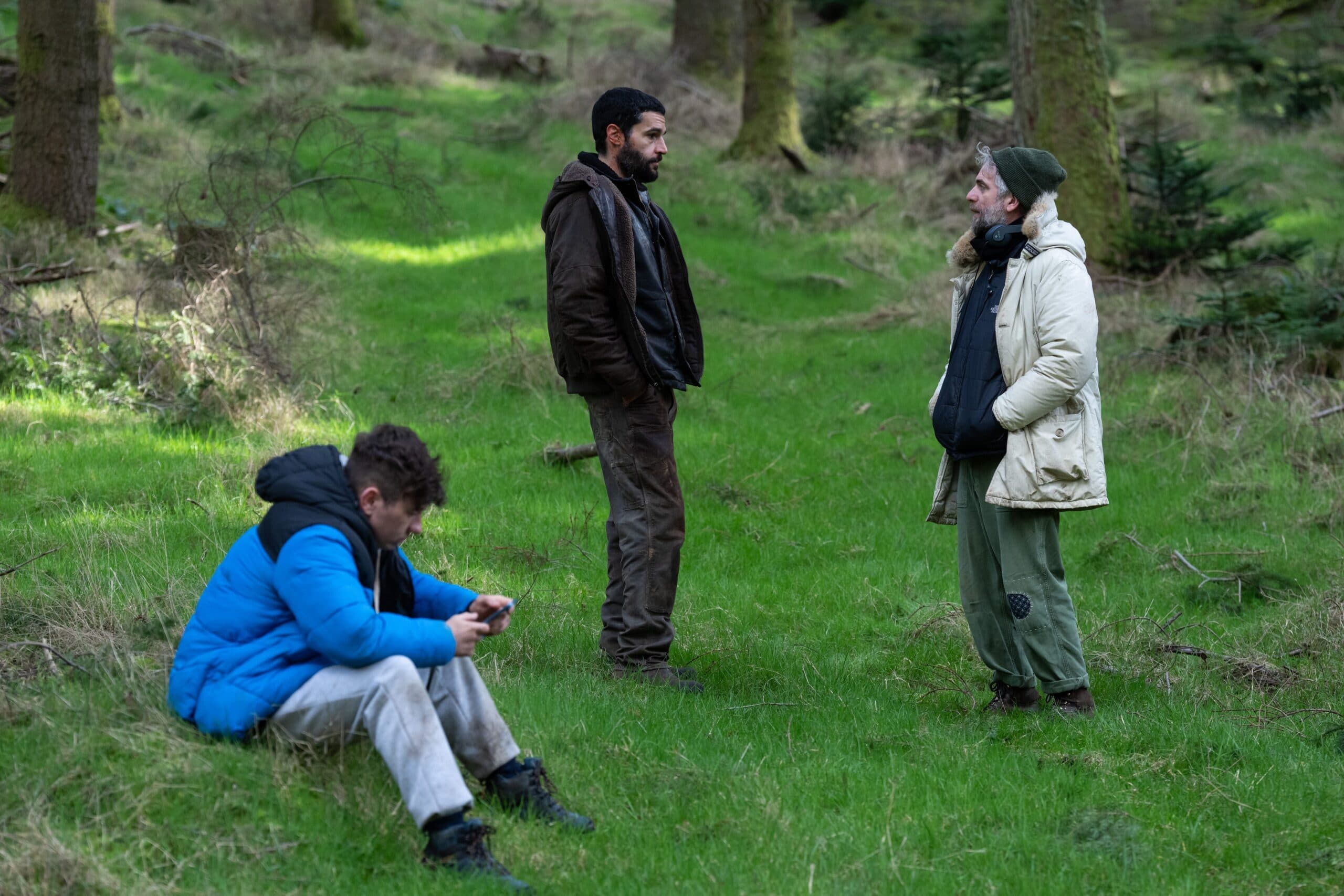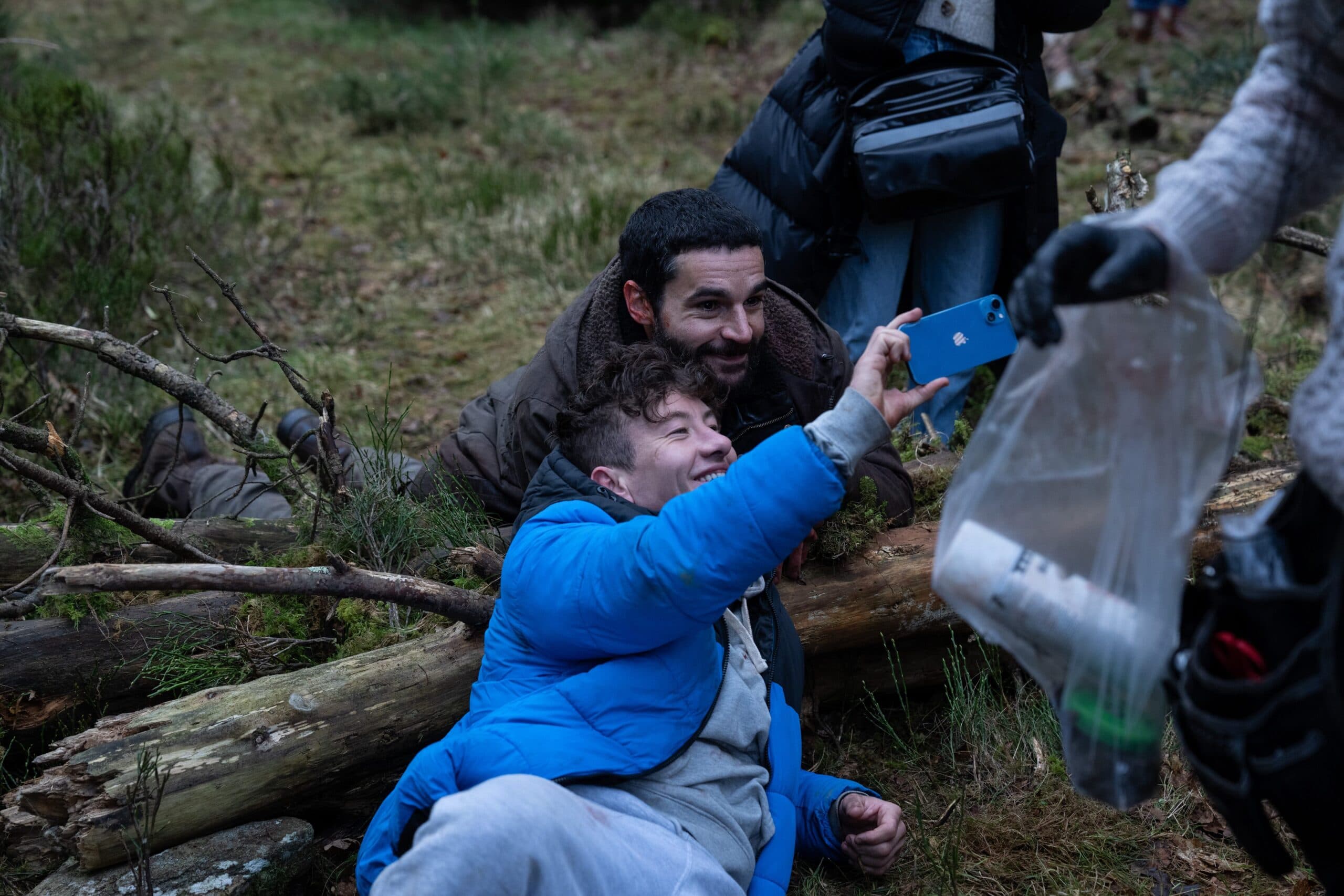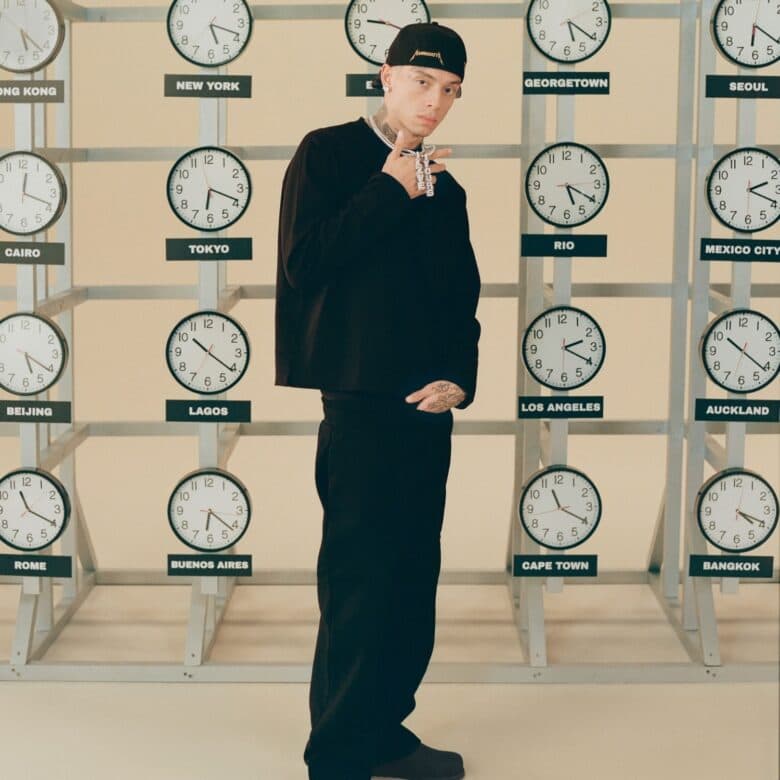Christopher Abbott on his “strange, sheep-farming mafia movie” with Barry Keoghan

If you’ve been down to the cinema in recent months, you’ll have seen Christopher Abbott’s face pop up in the trailer for Wolf Man. While we don’t get to see the Connecticut-born actor in canine-mode – that would obviously spoil it a bit – he is, of course, the eponymous wolf. It’s a far cry from the role that put Abbott on the map — the meek (and perpetually mistreated) boyfriend of Marnie Michaels in the seminal sitcom Girls. And during the ten or so years that have elapsed since his ostensible breakthrough? Abbott has built up a roster of indies that have seen him get all psychosexual opposite Margaret Qualley (Sanctuary), do a Cronenberg horror (Possessor), and, in 2023, get turned into a goat-human hybrid. That was for Yorgos Lanthimos’ highly acclaimed Poor Things. It could be positioned as a kind of spiritual predecessor to Wolf Man, if that’s the way you tend to look at things.
All things said – and despite that chameleon-like nature of his – it’s still a surprise to see Abbott in Bring Them Down, a drama set in rural Ireland. It sees the actor opposite not only Irish darling Barry Keoghan, but a whole host of other equally talented (and very British) actors. “It was stressful being the only American [on set],” Abbott tells me over Zoom. As a viewer, however, it’s clear that stress might have been unfounded. Abbott proves he’s got the chops for it — and some. The actor adds a particular heft to first-time director Christopher Andrews’ already fable-like script, where two farming families feud over their flock and meet grisly consequences. Not only that, but he dons an Irish accent. He also speaks Gaelic.
When I sit down with Christopher Abbott ahead of Bring Them Down’s release in the UK and Ireland, we chat Paul Thomas Anderson, first-time directors’ apparent obsession with Paul Thomas Anderson, and why on earth there’s so many letters in the Irish language.

Amber Rawlings: Obviously you’re no stranger to independent cinema, but I think it could be said that it’s surprising to see you in an Irish drama. What drew you to the film?
Christopher Abbott: I mean, I’m surprised too. I guess the script, just because that’s my first introduction to it. I was describing it as a strange, sheep-farming mafia movie. Then I met [Christopher Andrews] and talked with him — he’s such a great writer. Very smart, but a sweet and collaborative person. I love his energy. I knew that it was going to be the right energy for me on set. Then when he said about the cast that he was getting together — all the pieces worked, you know what I mean? It was stressful being the only American, but was fun.
AR: Is it scary when it’s someone’s directorial debut? What are you going off?
CA: I’ve done a fair amount of first and second features. I don’t even want to use the word risk because I don’t think of it like, oh, I’m taking a risk with this person. But you are — you’re going off of gut instinct. I’m not even speaking about Chris and Bring Them Down here. You always get sent first features and every one has this, like, lookbook — they’ve always got Paul Thomas Anderson photos in them. You’re like, yeah, of course you want it to look like that and feel like this, but what are you actually going to do? [Christopher Andrews] didn’t feel like that. He has more experience than a typical first feature director. I felt very safe with him.
AR: You’ve talked about finding roles more satisfying when you can personally relate to the character. Michael is a man who’s being psychologically tormented. What do you have to tap into for that?
CA: What I like about this movie is that all the themes are pretty universal. They’ve been going on for a very long time — dealing with what’s passed down to you and what will you pass on. I’m not saying that I’m against topical movies, but these are themes that mean it doesn’t matter when you put the movie out. It’s about the human condition. And as someone who does therapy, I’m always curious about human behaviour. That’s why I do this.
AR: As well as touching on those universal themes, I think there’s a good dose of social commentary in Bring Them Down. There’s the Gaelic element, there’s the isolation felt by these rural communities… Is it nice to be part of a film with a “bigger” message?
CA: I mean, that’s a big thing, right? Language is being lost. That obviously happens a lot, but I know that there’s a big push to retain the Irish language. Bring Them Down touches on that. I’m talking as an audience member now, but there’s a lot of biblical allegories in this movie as well. It’s a very grounded, real drama, but there’s surreal things happening within that. Or like a Greek tragedy?
AR: How was it speaking Gaelic? That’s obviously a huge undertaking.
CA: Yeah, that was hard. It’s a weird one. Just in terms of when you see it written down, it’s insane. It’s like, why are there six G’s in this word? I had to learn it phonetically. This guy Peadar Cox, who was the accent and language coach, was very patient with me. It’s a little bit like going to school – it’s kind of tedious. It wasn’t, like, hippie actor work. It felt like homework. But once you get through that part, then you’re really able to have fun and play on set.
AR: How was it having Barry Keoghan as your comrade in this project?
CA: I knew Barry already. This was just, finally, the time we got to work together. We were both excited for that. I like watching him, but working with him — the quality he has on screen is there in person as well, which is really nice and refreshing. He’s very alive, and I’m drawn to that.
AR: The film defies easy genre classification — part kitchen-sink, part psychological thriller, part horror. How did that complexity shape your approach to the role?
CA: I think that would be too much for me to worry about. I can only do my job, which is to do whatever as truthfully as possible or as untruthfully as possible, depending on what the director wants. With genre, it’s up to Chris. That’s his department. I just have to commit. Chris and I would talk about it. Like, at times it did feel like a kitchen sink drama. Other times I’m carrying a head in a bag down a mountain for whatever reason. But you just go for it and hope it all comes together.

AR: You’ve worked across independent and larger productions. What keeps drawing you to these smaller projects? Is there a kind of creative freedom?
CA: I don’t feel like I’m doing indies, then stepping out, then coming back. It’s just the timing of when work comes and things align, you know what I mean? I joke about how I’m not really in control of my career — only a little bit. The thing I’ll say about independent films is there’s less time. Like, when you have twenty or thirty odd days, you’ve just got to shoot and go. I like the time pressure of that. It forces you to make decisions. And that’s for every department, too. Whether you’re the director or the actor or the DP, it forces your hand. Because you can talk things out of existence. And with independent films, there’s inherently less cooks in the kitchen. There’s less people around. You’re able to collaborate and experiment.
AR: How are you feeling about the film’s release over here in the UK? I know people can be very finicky about actors and accents. Is it nerve-wracking?
CA: In a way, yeah, sure. But, then, I don’t know. It takes me, like, five minutes to get over it. In this day and age, things come and go – good or bad – pretty quickly. If people get on my accent, then it’ll all be over in a week, when there’s something else to talk about. I can’t worry too much about it.
Bring Them Down is released at cinemas across the UK and Ireland on the 7th of February.




